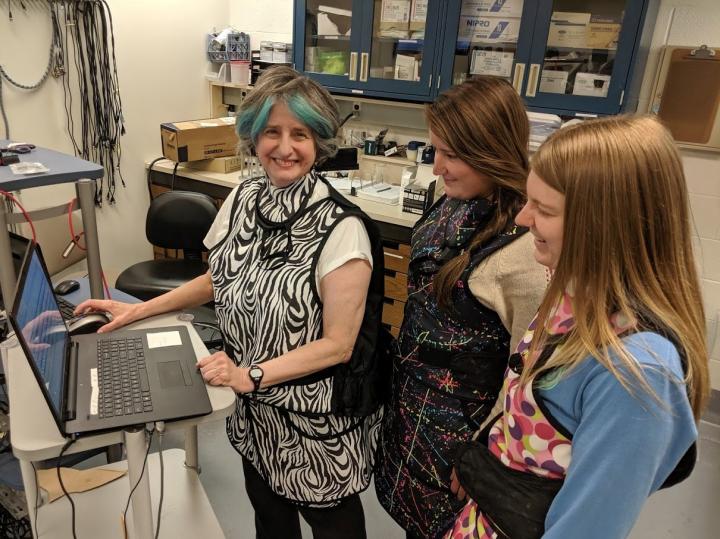Receives $624,518 award from the Eunice Kennedy Shriver National Institute of Child Health and Human Development

Credit: Courtesy of NEOMED
ROOTSTOWN, OHIO– Rebecca German, Ph.D., a professor of anatomy and neurobiology and researcher at Northeast Ohio Medical University was recently awarded a $624,518 grant from the Eunice Kennedy Shriver National Institute of Child Health and Human Development to determine how, and at what age, oral stimuli change feeding-respiration coordination in newborns.
Sucking, swallowing, and their coordination with breathing, are often compromised in preterm infants, yet are critical to their long-term health outcomes. One of the reasons there’s little understanding of the impact of interventions on these functions is that human preterm infants are a fragile research population, with restrictions on experimental manipulations.
Dr. German’s study, titled “The effect of sensory intervention on swallowing and respiration through neurological maturation in preterm infants,” uses an animal model, the preterm infant pig, to measure feeding and breathing that can be translated to human patients.
Dr. German serves as the principal investigator, and Francois Gould, Ph.D., a former research assistant professor in the German lab, is co-investigator. Christopher Mayerl, Ph.D., is a postdoctoral fellow on this project, and Rachel Mulheren, Ph.D., is a consultant from Case Western University.
“We have designed a therapeutic intervention for helping preterm human infants, and will test it in our pig model,” said Dr. German. “Because this work is based on how the brain works, how the muscles work, and how infants function, it has potential for helping people of all ages who have feeding problems.”
It is known that a positive stimulation (i.e., gentle vibration) of the lips or mouth can induce rhythmic sucking in preterm as well as full term infants. And many think that there are connections in the brainstem where these sensory nerves (information going into the brain) are connected to motor nerves (information going out of the brain) that control the cheeks and the tongue, which are important for sucking.
Previous work from Dr. German’s lab shows that these sensory nerves are also communicating, in the brainstem, to motor nerves of the muscles that make swallowing happen.
Since 2013, Dr. German’s lab has focused on understanding the biomechanics and pathology of neural control of swallowing using an animal model. Swallowing difficulties, and the failure to protect the airway, are a major cause of health problems in premature or preterm infants.
The neurological cause for these problems is unknown, and as a result there are few effective therapies. Understanding the mechanism of airway protection failure will provide a biological basis for decisions about care and intervention in these fragile and cherished patients.
Do these sensory nerves communicate with the parts of the brainstem that control breathing? How are these relationships between sensory and motor nerves different in preterm infants? Does the degree of prematurity matter to this control? How does growth and maturation of infants in the first few months of life change the nervous system for sucking, swallowing and breathing?
“We don’t know. And that’s why this work is so important: to determine if we can leverage these connections into a rehabilitation strategy for preterm infants,” added Dr. German.
###
About NEOMED
For more than 40 years, Northeast Ohio Medical University has worked in collaboration with its educational, clinical and research partners to successfully train health professionals and medical researchers who serve and impact the region and beyond. The University trains students in a team-based, interprofessional environment and offers Doctor of Medicine (M.D.) and Doctor of Pharmacy (Pharm.D.) degrees, in addition to master’s and doctoral degrees and research opportunities in other medical areas. In addition to research conducted within its colleges, NEOMED advances innovation and research in health care through six research focus areas. http://www.
Media Contact
Roderick L. Ingram Sr.
[email protected]




